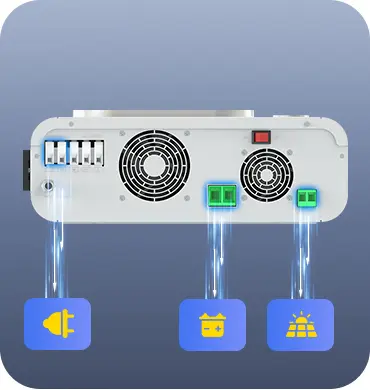With the widespread application of renewable energy and the continuous development of home energy storage systems, home storage inverters, as a key component, have become the focus of attention and how to extend their service life.

1. Life factors of home storage inverter
Working environment: Home storage inverters usually work in specific outdoor or indoor environments. Factors such as ambient temperature, humidity, dust, etc. will affect their lifespan. Excessively high or low temperatures, humid environments, and dust accumulation may cause inverter failure and performance degradation.
Quality and manufacturing process: The quality and manufacturing process of the inverter are directly related to its lifespan. High-quality materials, exquisite manufacturing processes and strict quality control can improve the reliability and durability of the inverter.
Frequent switching on and off: Frequent switching on and off will impact the electronic components and circuits of the inverter, increase the risk of failure, and shorten its life.
Overload and overvoltage: If the inverter is subjected to excessive load or voltage during operation, it will cause the components to overheat and be damaged, thereby affecting the lifespan.
Maintenance and upkeep: Regular maintenance and upkeep is essential to extend the life of your inverter. This includes cleaning, checking connections, firmware updates, and more.
2. Methods to extend the service life of home storage inverter
Choose a suitable installation location: The inverter should be installed in a well-ventilated location away from direct sunlight and moisture. Ensure that the surrounding environment temperature is appropriate, which is conducive to heat dissipation and reduces the impact of temperature on the inverter.
Quality and brand selection: When purchasing a home storage inverter, choose brands and products with reliable quality and reputable reputation. Refer to user reviews and test reports from professional organizations to choose an inverter with good performance and durability.
Reasonable use and load management: Avoid the inverter from being overloaded for a long time, distribute the load reasonably, and ensure that it operates within the rated power range. At the same time, avoid sudden high-power impacts to avoid damage to the inverter.
Regular maintenance and inspection: Clean the radiator, fan and filter of the inverter regularly and maintain good ventilation. Check whether the connection cable is loose, whether the firmware needs to be updated, and find and solve potential problems in time.
Avoid frequent power on and off: Minimize unnecessary power on and off operations and avoid frequent switching of the inverter’s working mode. When not in use for a long time, the inverter should be shut down properly.
Battery management: Proper battery management is also very important for the life of the inverter. Ensure the normal charging and discharging of the battery and avoid overcharging and over-discharging to extend the life of the battery and inverter.
Monitoring and fault diagnosis: Install a monitoring system to monitor the operating status and parameters of the inverter in real time. Discover fault signs in a timely manner and perform diagnosis and repair to avoid the expansion of faults and further damage to the inverter.
Extending the service life of a home storage inverter requires comprehensive consideration of multiple factors and the adoption of appropriate maintenance and management measures. Through reasonable installation, correct use, regular maintenance and timely fault handling, the life of the inverter can be effectively extended and the reliability and stability of the home energy storage system can be improved. In the development of renewable energy, the extended life of inverters will bring users a more durable and efficient energy utilization experience.




